Tag Archives: Gov. Janet Mills
Carl Wilson gets committee nod to lead Maine Department of Marine Resources
 A legislative panel on Thursday voted unanimously to advance the nomination of Carl Wilson to lead the Maine Department of Marine Resources. Fishermen and the aquaculture industry told lawmakers that Wilson’s long tenure with the department and experience as a scientist make him a good fit to lead DMR. He joined the department in 1999 as lead lobster biologist and since 2015 has led the Bureau of Marine Science. “We need somebody who can hit the ground running,” said Patrice McCarron of the Maine Lobstermen’s Association. “He is well prepared to lead on day one.” He said the industry may not always agree with him, but that he’s willing to listen and wants to work more closely with them. “As a scientist, I was always the one throwing a hand grenade into the room and now I’m the one who has to jump on it,” Wilson said. more, >>CLICK TO READ<< 06:20
A legislative panel on Thursday voted unanimously to advance the nomination of Carl Wilson to lead the Maine Department of Marine Resources. Fishermen and the aquaculture industry told lawmakers that Wilson’s long tenure with the department and experience as a scientist make him a good fit to lead DMR. He joined the department in 1999 as lead lobster biologist and since 2015 has led the Bureau of Marine Science. “We need somebody who can hit the ground running,” said Patrice McCarron of the Maine Lobstermen’s Association. “He is well prepared to lead on day one.” He said the industry may not always agree with him, but that he’s willing to listen and wants to work more closely with them. “As a scientist, I was always the one throwing a hand grenade into the room and now I’m the one who has to jump on it,” Wilson said. more, >>CLICK TO READ<< 06:20
Rep. Paul Presents Bills to Protect Sears Island from Offshore Wind Development
 Protecting Sears Island from exploitative development has been a mission of its Waldo County defenders for decades, and the latest leader in this effort wants to make sure that it is not turned into a port for controversial wind turbines. On Wednesday, the Maine’s Legislative Committee on Environment and Natural Resources held public hearings on Wednesday for two bills from Rep. Reagan Paul (R-Winterport) that would codify protections for Sears Island into law and prevent it from being developed for that offshore turbines that have raised the ire of fishermen up and down the coast. more, >>CLICK TO READ<< 14:14
Protecting Sears Island from exploitative development has been a mission of its Waldo County defenders for decades, and the latest leader in this effort wants to make sure that it is not turned into a port for controversial wind turbines. On Wednesday, the Maine’s Legislative Committee on Environment and Natural Resources held public hearings on Wednesday for two bills from Rep. Reagan Paul (R-Winterport) that would codify protections for Sears Island into law and prevent it from being developed for that offshore turbines that have raised the ire of fishermen up and down the coast. more, >>CLICK TO READ<< 14:14
Maine: Commercial fishery value increases by $75M in 2024
 Commercial seafood landings earned Maine harvesters $74 million more in 2024 than the year before, according to preliminary data the Maine Department of Marine Resources released Thursday. The higher value of Maine lobsters — a year-over-year increase of $46 million — helped drive $74 million more in earnings for commercial harvesters across the board. “During a year shaped by unprecedented storms and damage to our working waterfronts, Maine’s commercial fishermen, aquaculturists, and seafood dealers once again delivered a major economic benefit to our state,” said Gov. Janet Mills. Even though in 2024, Maine’s commercial lobster fishery rose in value, about 10 million less pounds of lobsters landed on the docks. Photos, more, >>CLICK TO READ<< 14:24
Commercial seafood landings earned Maine harvesters $74 million more in 2024 than the year before, according to preliminary data the Maine Department of Marine Resources released Thursday. The higher value of Maine lobsters — a year-over-year increase of $46 million — helped drive $74 million more in earnings for commercial harvesters across the board. “During a year shaped by unprecedented storms and damage to our working waterfronts, Maine’s commercial fishermen, aquaculturists, and seafood dealers once again delivered a major economic benefit to our state,” said Gov. Janet Mills. Even though in 2024, Maine’s commercial lobster fishery rose in value, about 10 million less pounds of lobsters landed on the docks. Photos, more, >>CLICK TO READ<< 14:24
Maine’s embattled outgoing lobster official to headline regional fisheries forum
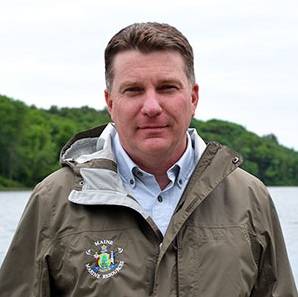 The appearance of Maine’s top lobstering official at New England’s largest fishing convention has gone unnoticed for 49 years – until this year. When the Maine Fishermen’s Forum celebrates its jubilee 50th year as the northeast’s biggest fishing gathering in Rockport, all eyes will be on Patrick Keliher. As the state’s outgoing commissioner of marine resources, Keliher “will provide an update on potential regulation changes in the industry,” the forum announced. But as he does so Keliher will be making his final marquee public appearance at the convention just 13 days before he leaves office under a political cloud. more, >>CLICK TO READ<< 07:20
The appearance of Maine’s top lobstering official at New England’s largest fishing convention has gone unnoticed for 49 years – until this year. When the Maine Fishermen’s Forum celebrates its jubilee 50th year as the northeast’s biggest fishing gathering in Rockport, all eyes will be on Patrick Keliher. As the state’s outgoing commissioner of marine resources, Keliher “will provide an update on potential regulation changes in the industry,” the forum announced. But as he does so Keliher will be making his final marquee public appearance at the convention just 13 days before he leaves office under a political cloud. more, >>CLICK TO READ<< 07:20
Maine’s offshore wind ambitions: Big ideas tempered by setbacks and competition
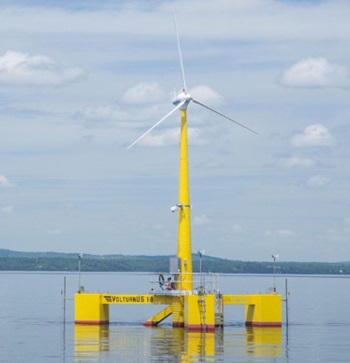 The planned launch later this year of a second-generation floating wind turbine platform off the Maine coast will mark the latest step in the state’s winding path to developing an offshore wind energy industry. Maine’s formal interest in developing ocean wind energy dates back to 2008, when former Gov. John Baldacci created an Ocean Energy Task Force to devise a strategy. The work began in the midst of a deep recession marked by soaring petroleum prices, in a state with the greatest dependence on heating oil. Baldacci and other advocates saw ocean energy as a tool to free Maine from its imported petroleum addiction. Underscoring the potential, U.S. Sen. and former Maine Gov. Angus King called the Gulf of Maine “the Saudi Arabia of Wind.” Two years later, the Legislature unanimously passed the Ocean Energy Act, which among other things set a target of developing 5,000 megawatt of offshore wind capacity by 2030. Today, it seems that no generation will be in place by that date. But the outlook was brighter 15 years ago. more, >>CLICK TO READ<< 12:44
The planned launch later this year of a second-generation floating wind turbine platform off the Maine coast will mark the latest step in the state’s winding path to developing an offshore wind energy industry. Maine’s formal interest in developing ocean wind energy dates back to 2008, when former Gov. John Baldacci created an Ocean Energy Task Force to devise a strategy. The work began in the midst of a deep recession marked by soaring petroleum prices, in a state with the greatest dependence on heating oil. Baldacci and other advocates saw ocean energy as a tool to free Maine from its imported petroleum addiction. Underscoring the potential, U.S. Sen. and former Maine Gov. Angus King called the Gulf of Maine “the Saudi Arabia of Wind.” Two years later, the Legislature unanimously passed the Ocean Energy Act, which among other things set a target of developing 5,000 megawatt of offshore wind capacity by 2030. Today, it seems that no generation will be in place by that date. But the outlook was brighter 15 years ago. more, >>CLICK TO READ<< 12:44
Feds deny Maine’s request for $456M to help build offshore wind port
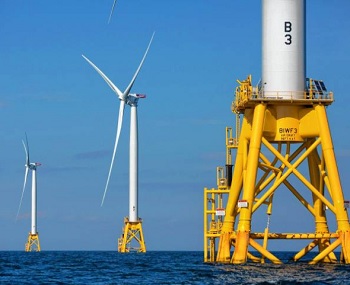 The federal government turned down Maine’s request for a $456 million grant that would cover most of the cost of building an offshore wind port on Sears Island, officials confirmed Tuesday. The Maine Department of Transportation had applied in May for $456 million from a competitive federal fund focused on multimodal transportation. Following protests from environmentalists, tribes and Republicans, the state picked Sears Island over nearby Mack Point earlier this year for the staging area of the offshore wind port and said the project will cost $760 million. more, >>CLICK TO READ<< 15:05
The federal government turned down Maine’s request for a $456 million grant that would cover most of the cost of building an offshore wind port on Sears Island, officials confirmed Tuesday. The Maine Department of Transportation had applied in May for $456 million from a competitive federal fund focused on multimodal transportation. Following protests from environmentalists, tribes and Republicans, the state picked Sears Island over nearby Mack Point earlier this year for the staging area of the offshore wind port and said the project will cost $760 million. more, >>CLICK TO READ<< 15:05

NEFSA Petition Urging Janet Mills to Halt Development of Offshore Wind in Gulf of Maine Receives Over 2,500 Signatures
The New England Fishermen’s Stewardship Association (NEFSA) will be sending Gov. Janet Mills a petition with over 2,500 signatures urging her to halt the development of offshore wind farms in the Gulf of Maine, according to a source close to the matter. NEFSA is a bipartisan nonprofit organization dedicated to helping save the region’s commercial fishing industry and preserving it for future generations. Signatories on the petition include commercial fishermen, as well as residents of New England maritime communities. In a copy of the petition’s letter obtained by the Maine Wire, NEFSA CEO Jerry Leeman urged Gov. Mills to follow in the footsteps of Oregon Gov. Tina Kotek (D) by asking the Bureau of Ocean Management (BOEM) to halt its efforts to lease property off the coast. more, >>CLICK TO READ<< 07:52
Gov. Mills to lead trip to Norway and Denmark to talk offshore wind
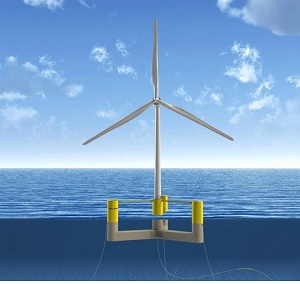 Gov. Janet Mills and a group of state officials will travel to Norway and Denmark next week to learn more about offshore wind development in those two countries. During the six-day trip, Mills and her delegation plan to visit floating offshore wind turbines in the North Sea and meet with Norwegian and Danish government officials as well as energy industry representatives. The group plans to speak with Denmark’s top minister for climate initiatives and representatives for the operator of that country’s electricity grid. Mills has said the Gulf of Maine’s abundant wind resources offer a “historic opportunity” to generate more electricity from renewable sources while creating good-paying jobs. But her efforts to jumpstart an offshore wind industry face stiff opposition from some groups, most notably Maine’s powerful lobster industry. Fishermen contend that the floating platforms could bar them from important lobstering grounds. more, >>CLICK TO READ<< 10:26
Gov. Janet Mills and a group of state officials will travel to Norway and Denmark next week to learn more about offshore wind development in those two countries. During the six-day trip, Mills and her delegation plan to visit floating offshore wind turbines in the North Sea and meet with Norwegian and Danish government officials as well as energy industry representatives. The group plans to speak with Denmark’s top minister for climate initiatives and representatives for the operator of that country’s electricity grid. Mills has said the Gulf of Maine’s abundant wind resources offer a “historic opportunity” to generate more electricity from renewable sources while creating good-paying jobs. But her efforts to jumpstart an offshore wind industry face stiff opposition from some groups, most notably Maine’s powerful lobster industry. Fishermen contend that the floating platforms could bar them from important lobstering grounds. more, >>CLICK TO READ<< 10:26
Downeast businesses are learning from January storms. How Midcoast Maine can learn from Downeast.
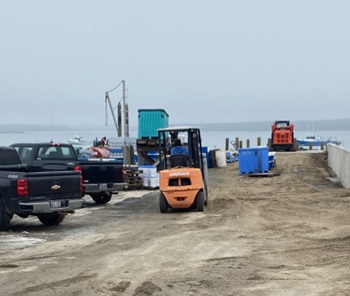 The owners of Chipman’s Wharf, a seafood market, buying station and restaurant in Milbridge, had a brutal awakening after the powerful January storms wiped away their 106-foot wharf. The proprietors, brothers Chris and Jason Chipman and their wives, had insurance that would have covered damage to the pier from fire or an airplane crash, but not storms. The two families are still reeling from the shock. The Maine Coast Fishermen’s Association estimated at least 60 percent of Maine’s working waterfronts were heavily damaged or destroyed in the January storms. Since then, many coastal businesses have had to decide whether to abandon their enterprises or rebuild, hoping to fortify their properties against future major storms — in some cases with a cash infusion from the state. more, >>CLICK TO READ<< 07:16
The owners of Chipman’s Wharf, a seafood market, buying station and restaurant in Milbridge, had a brutal awakening after the powerful January storms wiped away their 106-foot wharf. The proprietors, brothers Chris and Jason Chipman and their wives, had insurance that would have covered damage to the pier from fire or an airplane crash, but not storms. The two families are still reeling from the shock. The Maine Coast Fishermen’s Association estimated at least 60 percent of Maine’s working waterfronts were heavily damaged or destroyed in the January storms. Since then, many coastal businesses have had to decide whether to abandon their enterprises or rebuild, hoping to fortify their properties against future major storms — in some cases with a cash infusion from the state. more, >>CLICK TO READ<< 07:16
Weatherbeaten Maine Seeks More Resilient Infrastructure
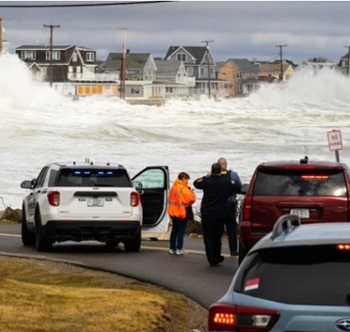 Stonington, Maine, is an island town in Penobscot Bay with a year-round population of just over 1,000 people. Its lobster fishing port is the biggest in the state, supplying about 11 percent of all the Maine lobster that gets shipped to food markets around the world. In January, a winter storm caused a surge that flooded out a string of privately owned wharves that support the lobster industry and washed over a publicly owned commercial pier, knocking out all of its electronics. “We basically got hit by a wall of water,” says Linda Nelson, Stonington’s director of economic development. more, >>CLICK TO READ<< 10:10
Stonington, Maine, is an island town in Penobscot Bay with a year-round population of just over 1,000 people. Its lobster fishing port is the biggest in the state, supplying about 11 percent of all the Maine lobster that gets shipped to food markets around the world. In January, a winter storm caused a surge that flooded out a string of privately owned wharves that support the lobster industry and washed over a publicly owned commercial pier, knocking out all of its electronics. “We basically got hit by a wall of water,” says Linda Nelson, Stonington’s director of economic development. more, >>CLICK TO READ<< 10:10
Maine to spend $25 million to rebuild waterfront after devastating winter storms and flooding
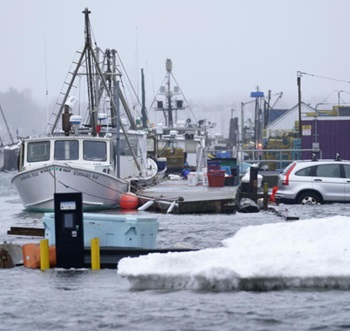 Maine’s government will spend tens of millions of dollars to rebuild the state’s working waterfront communities after a series of devastating winter storms pummeled the state’s docks, wharves and coastal businesses. The back-to-back storms hammered the Northeast in January and hit Maine and New Hampshire especially hard, bringing flooding and heavy damage to dozens of businesses. State officials in Maine said the storms, which were later declared a “major disaster” by President Joe Biden, caused about $70 million in damage in the state. more, >>CLICK TO READ<< 08:06
Maine’s government will spend tens of millions of dollars to rebuild the state’s working waterfront communities after a series of devastating winter storms pummeled the state’s docks, wharves and coastal businesses. The back-to-back storms hammered the Northeast in January and hit Maine and New Hampshire especially hard, bringing flooding and heavy damage to dozens of businesses. State officials in Maine said the storms, which were later declared a “major disaster” by President Joe Biden, caused about $70 million in damage in the state. more, >>CLICK TO READ<< 08:06
Waterfront property owners scramble to repair after damaging storms, fearing lobster fishing season at risk
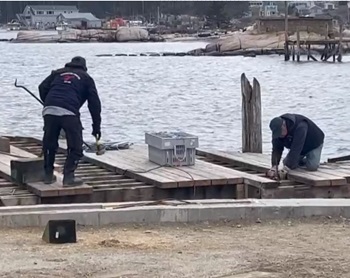 According to Gov. Janet Mills, the back-to-back storms that hit the state earlier this year left behind more than $70 million in damage to Maine’s infrastructure, including the destruction of several working waterfront properties and docks, ultimately leaving the success of this year’s lobster fishing season uncertain. Last week, the Maine Legislature signed off on a $60 million supplemental budget for storm damage relief. Aldrige’s ferry dock was damaged by storms as well, but his repairs are complete. He said he’s watching lobstermen push on at their lowest. “Fishermen are carting bait from trucks down on carts to where a dock used to exist,” Video, more, >>CLICK TO READ<< 09:28
According to Gov. Janet Mills, the back-to-back storms that hit the state earlier this year left behind more than $70 million in damage to Maine’s infrastructure, including the destruction of several working waterfront properties and docks, ultimately leaving the success of this year’s lobster fishing season uncertain. Last week, the Maine Legislature signed off on a $60 million supplemental budget for storm damage relief. Aldrige’s ferry dock was damaged by storms as well, but his repairs are complete. He said he’s watching lobstermen push on at their lowest. “Fishermen are carting bait from trucks down on carts to where a dock used to exist,” Video, more, >>CLICK TO READ<< 09:28
Floating offshore wind experts say they want to coexist with Maine lobstermen, but lobstermen say no thanks
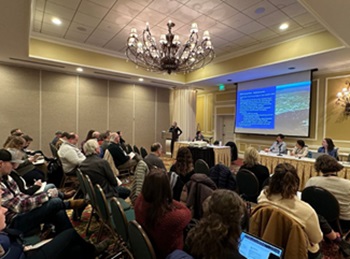 Lobstermen asked pointed questions Thursday about a planned offshore floating wind array that they fear will take away fishing grounds and potentially disrupt the species they rely on to make a living. “Offshore wind overall we have a lot of issues with,” Virginia Olsen, political director of the Maine Lobstering Union said. “We know it will be industrializing our ocean and as fishermen we just don’t want to see that happen.” During the Thursday presentation, state officials and consultants working on the floating array emphasized they want to work toward “coexistence” between the new technology and the fishing industry. But that didn’t sit well with some of the lobstermen, who said they don’t want to co-exist with the turbines. more, >>click to read<< 06:50
Lobstermen asked pointed questions Thursday about a planned offshore floating wind array that they fear will take away fishing grounds and potentially disrupt the species they rely on to make a living. “Offshore wind overall we have a lot of issues with,” Virginia Olsen, political director of the Maine Lobstering Union said. “We know it will be industrializing our ocean and as fishermen we just don’t want to see that happen.” During the Thursday presentation, state officials and consultants working on the floating array emphasized they want to work toward “coexistence” between the new technology and the fishing industry. But that didn’t sit well with some of the lobstermen, who said they don’t want to co-exist with the turbines. more, >>click to read<< 06:50
House Republicans rebuff move by Golden to block offshore wind in Gulf of Maine lobster area
 Majority Republicans in the U.S. House of Representatives rejected an attempt by Rep. Jared Golden, D-Maine, to use federal spending to block offshore wind development in a lobster fishing area of the Gulf of Maine. Golden, who tried to amend 2024 appropriations legislation for the Department of Interior, said he will try again to bar offshore wind development in what’s known as Lobster Management Area 1. His measure sought to prevent funding to lease, license, permit or provide any authorization to develop offshore wind energy that could jeopardize lobster fishing. “Offshore wind development in the Gulf’s most productive fishing grounds is a threat to Maine fishermen’s way of life,”>>click to read<< 07:28
Majority Republicans in the U.S. House of Representatives rejected an attempt by Rep. Jared Golden, D-Maine, to use federal spending to block offshore wind development in a lobster fishing area of the Gulf of Maine. Golden, who tried to amend 2024 appropriations legislation for the Department of Interior, said he will try again to bar offshore wind development in what’s known as Lobster Management Area 1. His measure sought to prevent funding to lease, license, permit or provide any authorization to develop offshore wind energy that could jeopardize lobster fishing. “Offshore wind development in the Gulf’s most productive fishing grounds is a threat to Maine fishermen’s way of life,”>>click to read<< 07:28
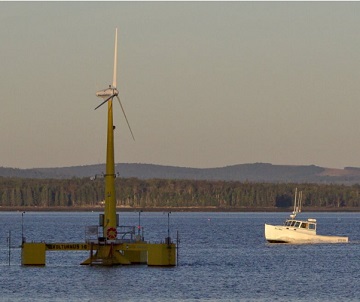
U.S. Rep. Jared Golden introduced a bill in Congress that would prevent offshore wind development in key fishing area
The bill would prevent the federal Bureau of Ocean Energy Management from potentially hurting the fishing and lobstering industries in Maine, said Golden, D-2nd District. The legislation also would launch an assessment of how federal agencies like the BOEM and the National Marine Fisheries Service study the effects of offshore wind development and engage with industry groups. Lobster Management Area 1 is the zone closest to the shores of Maine and stretches along the entire coast. That’s where Virginia Olsen, a commercial lobsterman and director of the Maine Lobstering Union, says a majority of Maine fishing and lobstering is concentrated. “I think this is the exclusion zone that the Maine Lobster Union and the area that the (Maine Lobstermen’s Association) would agree is most important economically to the fishery,” Golden said. >click to read< 19:46
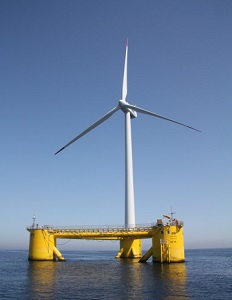
Role of Unionized Firms at Center of Maine’s Offshore Wind Debate
On Thursday the Maine Legislature’s Energy, Utilities and Technology Committee held a public hearing on a proposal to pave the way for the development of offshore wind infrastructure in the Gulf of Maine, including the construction of a coastal manufacturing facility that would build the offshore floating wind turbines Lawmakers also considered Thursday Rep. Tiffany Strout’s (R-Harrington) LD 1884, a bill that would block offshore wind developments. In recent years, the prospect of filling the Gulf of Maine with hundreds of wind turbines has taken on an air of inevitability, with environmental groups, industry groups, and well-paid lobbyists pouring millions of dollars into political pressure campaigns and ad campaigns designed to build support for the project. Unions, construction companies, investment companies, and lobbyists are all lining up to secure their share of what could be one of the largest taxpayer-funded projects in the history of the state. >click to read< 09:42

A year after record-breaking catch, value of Maine lobster landings are lowest in a decade
Maine lobstermen hauled in the least valuable lobster catch in a decade last year, when a decrease in price per pound and higher operational costs gave them less incentive to get out on the water. The $389 million haul, a 47% drop from 2021’s record-shattering catch,,, The size of the haul, 98 million pounds, was nearly identical to the 10-year low hit in 2020, when lobstermen also scaled back operations, then because of the closure of traditional markets as a result of the pandemic. Kristan Porter, a lobsterman from Cutler and president of the Maine Lobstermen’s Association, laid the blame for the drop in price per pound squarely on the economy. >click to read< 11:06
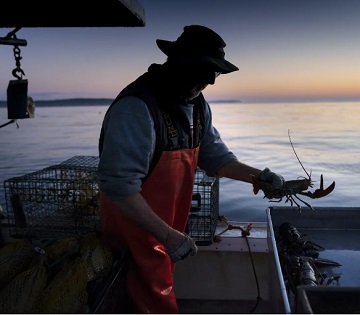
Maine lobstermen snipped by inflation as 2022 results fall nearly 50%
Fishers of Maine lobster, one of the most lucrative seafood species in the U.S., had a smaller haul during a year in which the industry battled surging fuel and bait prices, rebukes from key retailers and the looming possibility of new fishing restrictions. Maine lobster has exploded in value in recent years in part due to growing international demand from countries such as China. The industry brought about 98 million pounds of lobster to the docks worth about $389 million in 2022, Maine regulators said Friday. That was more than 11% less than the previous year, in which they harvested more than 110 million pounds of lobster worth more than $740 million. The value of lobsters also fell to a little less than $4 per pound at the docks, the lowest since 2017, a year after setting a record of more than $6.70 in 2021. >click to read< 10:33

With bill’s passage, lobster industry welcomes 6-year break from new regulations
Hours before a stopgap spending measure was set to expire, Congress voted to pass the $1.7 trillion omnibus package to fund the government through September 2023. The package passed in the Senate Thursday afternoon with a large bipartisan majority, 68-29. Maine’s delegation was able to include a rider in the package that protects lobstermen for six years from rules that the industry says would decimate the state’s iconic fishery and coastal economy. The provision essentially reverses a federal court decision this summer on new lobstering regulations by preventing them from taking effect until Dec. 31, 2028. >click to read< 09:14

Maine Pols Brag About Stopping Unscientific Lobster Regs in Monsterous $1.7T Omnibus Bill
Maine’s Congressional Delegation and Gov. Janet Mills gave themselves a hearty pat on the back Tuesday for convincing Members of Congress to temporarily halt an unscientific regulatory crusade on the Maine lobstering industry. Maine’s Congressional Delegation has in recent years also voted to massively increase NOAA’s funding, meaning Maine lawmakers helped fund the very crusade they’re now bragging about halting, temporarily. All told, NOAA’s funding has increased by more than $6 billion since President Joe Biden took office, all with the support of Maine’s elected officials. >click to read< 11:09
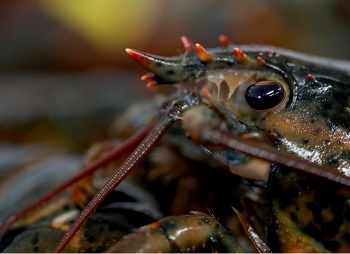
Lobster more than a Maine event
The headline said that Whole Foods would no longer be selling Maine lobster in its stores. My first reaction was to wonder what the lowly, although expensive crustacean had done to warrant such action from Whole Foods usually described as an upscale grocery chain that is owned by Amazon and as such is a part of the Jeff Bezos’ empire. To add insult to injury the California based Monterey Bay Aquarium through its environment focused seafood watch went and “red listed” Maine lobsters. I guess that means shipments of Maine lobsters will be stopped at the California border. I wonder if that includes the border with Mexico where just about anything gets through? Obviously, the Maine lobstering industry is up in arms over all this. >click to read< By Thomas Kirkpatrick Sr 12:56
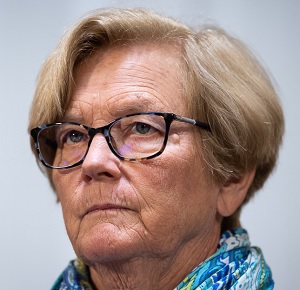
The fight to protect right whale, lobsters roils Maine politics
In a state where few things matter more than lobster, it’s no surprise that Mainers are getting a hefty portion of crustacean politics as part of the campaigning for the 2022 midterm elections. What is surprising, however, is the high level of anger and frustration pointed squarely at Washington regulators, with many arguing that NOAA’s new rules are unfair and will hit the prized lobster industry far too hard. Rule backers say they’ll help protect a dwindling population of whales that’s at grave risk from fishing gear. “The men and women who make up Maine’s iconic lobster fishery are facing a terrible crisis, a crisis not of their making, a crisis that is due to this administration’s onerous regulations,” photos, >click to read< 12:11

Maine lobstermen fight back – ‘You have failed us’: Maine lobstermen face federal regulators
Maine lobstermen came face to face with federal officials out to impose stricter new rules to save the 350 remaining endangered right whales Wednesday. There have only been two whale entanglements in Maine, most recently in 2004, and no right whale deaths caused by Maine lobster gear. Despite that, NOAA insists these rules are necessary to further reduce the risk of a right whale death. >click to read< ‘You have failed us’: Maine lobstermen face federal regulators – There were some tense moments during a public hearing with Maine lobstermen and federal regulators Wednesday night a the University of Southern Maine in Portland. The meeting comes after Gov. Janet Mills and members of Maine’s congressional delegation requested NOAA visit the state to discuss tougher rules on the lobster industry. >click to read< 07:51

Maine Elected Officials Rebuke “Seafood Watch” But Stay Silent on Endangered Species Act’s Threat to Lobstermen
Maine lobster was recently placed on the unsustainable “red list” by the environmental group Seafood Watch, a non-profit associated with the Monterey Bay Aquarium. Gov. Janet Mills, Sens. Susan Collins and Angus King, and Reps. Chellie Pingree and Jared Golden all came out in defense of the Maine lobster industry, defending its sustainability bona fides. It was a nice photo op, but the truth is King, Collins, and Pingree had plenty of warnings that the environmental left was using the Endangered Species Act (ESA) to damage Maine’s economy and sovereignty. They chose to do nothing. >click to read< 09:14

Island’s fate tied to fishing, residents say: “I think we’re being pushed out”
Make way for windmills. That was one of the worries aired by Deer Isle-Stonington fishermen and small business owners who attended a breakfast economic development meeting at the Stonington town office Friday. A few residents and small business owners said they think the fishing industry is being pushed out to make room for windmills, thus further advancing green energy agendas that Governor Janet Mills and the federal government have adopted. Mike Shepard said he started fishing at age 10 in a “little outboard.” “I’m almost 70 now,” the lobsterman said. “I fished all my life out here. All that time I’ve been fishing. I’ve never seen a whale. It has nothing to do with the whale, it has to do with what they want to do with our waters out here. They want to go green and it’s killing the lobster industry, which is our way of life.” >click to read< 19:36
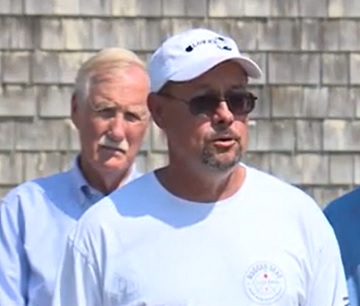
Maine lobstermen, politicians rally in protest of fishing restrictions and Seafood Watch’s recommended boycott
At a rally in Portland’s Old Port on Friday, they protested a federal judge’s ruling issue Thursday allowing the National Marine Fisheries Service, a branch of the National Oceanic and Atmospheric Association to impose limits on where and how lobstermen fish in order to protect endangered North Atlantic Right Whales. The rally was also protesting Seafood Watch, a California-based sustainable seafood advocacy group affiliated with the Monterey Bay Aquarium, now recommending food distributors and restaurants boycott Maine lobster in the name of saving the whales. Video, >click to read< 09:55






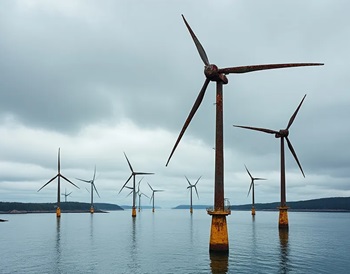
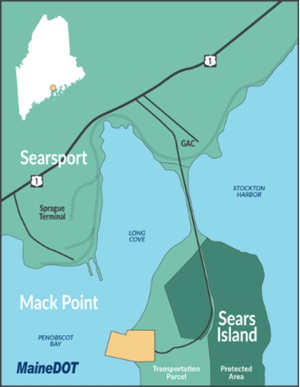
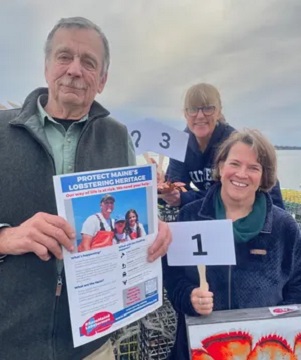



























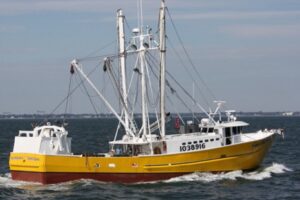


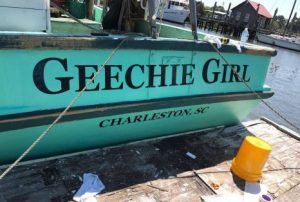
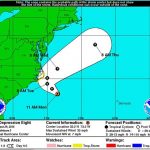
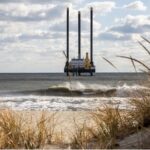
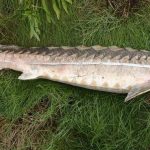


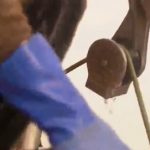

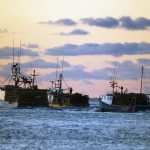



Maine’s leaders seek more time on whale protection rules
Maine Gov. Janet Mills is seeking to delay new federal whale protection rules, citing fears the state’s commercial lobstermen won’t be able to comply. In a letter to Commerce Secretary Gina Raimondo, Mills urges federal fisheries regulators to extend the period for collecting public comment on the new regulations, which are aimed at protecting critically endangered north Atlantic right whales by setting a seasonal closure and requiring modifications to gear. Mills said she believes it is “unconscionable” that the National Oceanic and Atmospheric Administration only plans to hold one remote public hearing on the new regulations, which call for reducing by 90% the number of Atlantic Coast fixed gear fisheries, including lobster industry. >click to read< 15:14
Share this post